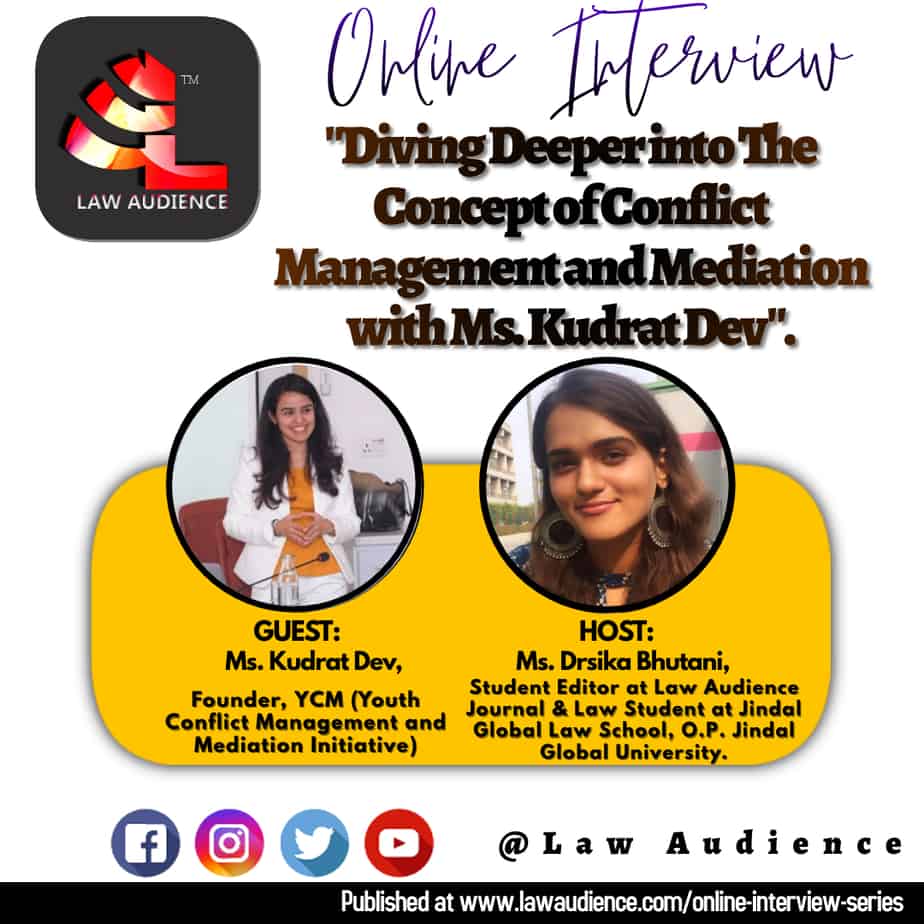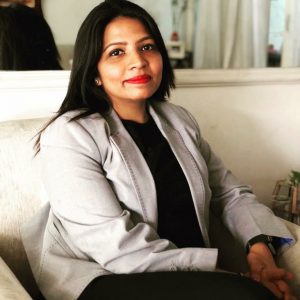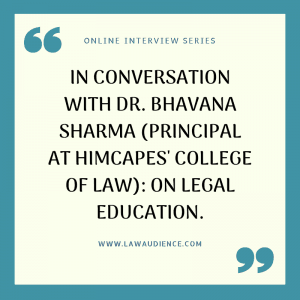This interview was taken by Ms. Drsika Bhutani (B.A.LL.B (Hons)), Student Editor at Law Audience Journal and 4th-year Law Student at Jindal Global Law School, O.P. Jindal Global University.
Read it, share it and comment your feedback…..
Interview Questions:
Question 1: Can you please introduce yourself for our readers?
Answer: I’m a lawyer and a mediator who had a professional change of heart; a litigator turned into the Founder of YCM, India’s first Youth Conflict Management and Mediation Initiative. I believe that Dispute Resolution and Dispute Prevention are life skills for everybody.
Question 2: Ms. Kudrat, as the founder of YCM (Youth Conflict Management and Mediation Initiative), my question to you is, what made you start this initiative?
Answer: No one is focusing on dispute prevention and YCM fills this gap. Dispute prevention is better than dispute resolution, although skills for both are necessary. Dispute resolution skills are limited to lawyers and no one is giving the due importance to dispute prevention. YCM is making these skills for preventing and resolving a dispute accessible and easy to learn for all citizens. Life is undoubtedly better with disputes resolved as they distract from what really matters in life: happiness, peace of mind, growth and productivity.
I think one of the factors was also the support of my mentor, Professor Ajay Pandey (Professor and Executive Director for Clinical Programmes, Jindal Global Law School), when you find someone who not only completely believes in your idea but is also extremely trustworthy- that’s when you take off with the initiative. The situation of mediation in India has had a lot of potential that wasn’t being utilized to the best of its abilities owing to various factors. The onset of the pandemic showed all of us the power of going virtual and a whole scope of digitalization that had so much left to be conquered, that’s when I decided that now is the time that citizens led by youth can make use of the technology to not only stay connected but can also make use of this opportunity to hone their skills and YCM took off well in the virtual set up.
Question 3: What is conflict management and how is that different from Mediation?
Answer: Conflict Management is a part of every dispute resolution process, be it arbitration, litigation or mediation, however, it goes a step further by acting as the tool that helps you to prevent disputes by detecting them early enough. On the other hand, Mediation is something that comes into action only after a dispute has arisen and there is a third party that is mediating the said dispute between two parties or more people. Conflict Management is a skill that can be used by mediators; however, it is also something that can be used by the parties themselves in a dispute. It is a tool for citizen empowerment as it helps to address the conflict at the moment where it arose and by the parties between whom it arose.
Question 4: What are the challenges that Mediation faces in India?
Answer: In my opinion, I think that the biggest challenge that is being faced by Mediation in India is that it tends to exclude a major chunk, more than half of the population, which happens to be the youth. That is why I believe that mediation is not successful to its maximum potential in India yet. People who have never been exposed to the concept and practice of mediation at an early stage, don’t know how to make use of it. A lot of people will tell you that lack of awareness or the lack of a codified law that backs mediation is the problem. At YCM we believe that the main problem is in the fact that you have excluded the citizens from the process of mediation and by that, I mean you have not equipped them with the relevant skills to make use of this process.
For instance, say I give you a brand-new phone with new features, however, I don’t provide you with a manual or a YouTube link which can tell you how to use it to its maximum ability, how will you use it? Similarly, citizens of our country are not equipped to use mediation and that is why mediation is failing in India. They still look for an adversarial process but at YCM we are equipping citizens with the mindset that they can take ownership of their dispute and learn how to resolve it; Mediation is all about that, the parties have to take ownership.
Question 5: How have Dispute Resolution skills- Particularly Mediation- benefitted/ helped you personally?
Answer: I think everybody, at one point or another, goes through inter-generational conflicts. You could be 35 or 100 years old and still have these conflicts and, in that essence, inter-generational conflicts prevail. My mediation skills have helped me have discussions on important and controversial topics in my own family, ranging from religion to equality to feminism to making crucial financial decisions, all topics that tend to get the debates heated and bitter, into a positive conversation. A positive conversation is something that not only eases the process of going through tough topics but also helps you be at peace, something that everyone needs but not everyone gets.
Question 6: To be a good mediator, does one need to be thorough with the skills of that of a conflict manager?
Answer: A person definitely tends to be a better mediator if one has the skills of a conflict manager. There is definitely an overlap of skills between that of a conflict manager and a mediator. As a mediator, one picks up the skills of a process where one has to handle a situation where there are two disputants in a room, whereas conflict management is more of a reflective process, these skills equip you to deal with the conflicts in your own life and others’ lives. I believe you cannot recommend things to others that you yourself haven’t tried and tested. The idea of becoming a Conflict Manager and then a Mediator is similar to this statement. You first learn to apply these skills to your conflicts and for your benefit, then as a mediator, you will help others with the same skill-set but now with their problems.
Question 7: What are some qualities and necessities that a mediator should possess?
Answer: A balance between attention to minute detail and seeing the whole/ larger picture, what the parties actually want and where do they see themselves, is what is the most important for a good mediator. The power to be able to identify where the ‘human connection’ is missing or present in the dispute is of utmost importance; if a mediator can do this, more than half of the issue at hand is resolved because they have figured out the exact area where the issue lies.
Question 8: While being non-biased in a huge component of being a mediator, is it really possible to leave aside all biases?
Answer: It is not possible to leave aside all biases and that’s exactly where awareness comes into the picture. You need to be aware of what your triggers are and where your biases come in. It is your duty to the party as a mediator to inform them in a situation where you have some preconceived notions and biases and you respectfully recuse yourself from that case. Spending time to understand and identify what your triggers are will help you greatly in the process of effective mediation. This is what will help you to become a neutral and impartial mediator. Something I carry with me every day is what I was told by Mr. Stephen Ruttle, QC, London one of the top commercial mediators in the U.K: “Be multi-partial”, it means ensuring that everyone sitting at the table has their own perspective and opinion coming out and you as the mediator truly hear all perspectives. Being multi-partial ensures that not being biased does not become a burden.
Question 9: At what point would you intervene in a client’s decision-making process?
Answer: A mediator will never intervene in a decision-making process but would be there to give the client a reality check by questioning the client in a manner that would make them ponder on: Does this fulfill my interest and needs in a sustainable way? A mediator will encourage the client to look at the decision from a questioning gaze to rethink that whether the proposed decision align with the client’s self-identified goals. The role of the mediator is to ensure that the strategies that have been put forth by the client are sustainable and this can only be done by asking the right questions. This is the maximum a mediator would go with regards to “intervening” in the decision-making process. My go-to question in a similar scenario would be “how does this align with your goals?” which makes them think. It would either make them stick to their decision after pondering or they might realize that something is missing and they need to re-strategize their decision.
Question 10: Mediation relies heavily upon the client’s decision, in a scenario where you as a mediator disagree with your client’s proposed solutions, what would you do?
Answer: As a mediator, you enter the room without any interest in what the clients are going to decide and with that mindset, regardless of a mediator agreeing or disagreeing with the said decisions, your sole goal becomes to ensure that both the parties are aligning with their goals. The mediator has to walk into the room with the knowledge that you do not have a say in what the parties decide. A mediator is only the owner of the process of mediation but not of the decisions that come out of it.
Question 11: On what kind of disputes can we apply mediation? And on what stage of a dispute do we need to/ can undertake the process?
Answer: India has seen varied support from different legislations when it comes to the kinds of disputes such as the Consumer Protection Act, Commercial Courts Act etc., from family matters to international disputes between countries, there really is no finite category to the kinds of disputes where mediation cannot be applied. Needless to say, it cannot be applied to criminal matters where it is said that the offence has taken place against the society at large. However, the stage of undertaking mediation is based on the will of the parties. Mediation is a voluntary process, only when the all the parties agree to explore the process, should they undertake it.
One can undertake mediation when a certain dispute has reached point x, it could be a fresh dispute or you could be in the middle of litigation, it could even be post judgement where the parties feel that their disputes have not been fully addressed and they’d like to look for a more amicable solution. In India, the Commercial Courts Act is providing mediation a push where it states that before you even come for the adversarial process, one should try out mediation first. The same would be my recommendation as well, give mediation a shot much earlier on in the dispute. Mr. Sriram Panchu, Senior Mediator and Senior Advocate is a member of YCM’s Panel of Expert Friends and recently at a YCM event he responded saying: “Sooner you use mediation, better is the outcome”.
Question 12: Can you shed some light on the effect of the pandemic on mediation and ADR?
Answer: The pandemic has affected mediation and ADR in both, a positive and a negative way. Mediation is a process where trust and rapport building are extremely important. It just so happens to be that the best way to go about it is in a room with the parties present physically, that allows you to read their body language and understand their needs and requirements without any disturbance or distraction. In the online platform, issues range from external factors such as getting calls or visitors to grave issues such as confidentiality. On the other hand, the positives would be that an online medium is pocket friendly. Lately arbitration in India had become and still remains a process that would burn holes in one’s pocket. The online transition has curbed that to a great extent. Another benefit is the increase in accessibility; when earlier you’d have to travel from place to place, leaving behind all work, one now has it all on their fingertips. From a mediator’s perspective, in online mediation you can see all parties’ face expressions at once on a zoom screen but in the physical set up your eyes follow to ping-pong gaze from one party to another and you miss out on one party’s face expressions.
Question 13: How much does a client’s technological literacy weigh into the process of mediation?
Answer: In the beginning of the pandemic, it weighed in heavily. However, what good mediators do is ‘housekeeping’. The mediator’s office will contact the client way before the mediation session is scheduled and explain all the technology that will be used and how to use the same for an effective session, thus ensuring that on the main day there are almost zero technological hiccups. This practice becomes extremely important because you need to make up for the fact that you can’t observe the client’s body language and it is on every mediator to put in that extra time and make the client feel comfortable with the process.
Question 14: Have you faced unexpected challenges in online mediation?
Answer: Everyone is bound to face some sort of challenges when it comes to something new. Issues that might seem small at first could actually have a grave consequence on the whole process. Something as small as losing network from either parties’ side or the mediator’s side can hamper the process. Mediation is all about the parties conversing and understanding, if you’re cut out from the process, even for a little bit, the consequences of it can be harmful. However, every coin has a flip side, these same challenges have sometimes been unexpectedly helpful as well. A situation for the same is when I was with my clients. While conducting a session with them, I got cut off due to network issues, however, the deafening silence that was prevalent when I was not present, turned into a small talk between the parties. The same technological error that we dread as professionals, triggered the parties into having a conversation among themselves, which turned out to be extremely helpful later.
Question 15: What does the future hold for ODR once the situation goes back to normal post COVID-19?
Answer: Post pandemic, I believe it will be a best of both worlds’ situation for ADR and ODR. I’ll relate this back to a question that was asked before about the impact of technology on the process. There are positives and negatives both for ODR. Once all of this ends, it would be a hybrid system that keeps only the positives from the options available to us. However, one must acknowledge that technological advancements end up resulting in many people losing out on their jobs. As we advance towards a more techno-savvy society, it becomes our duty to upscale the people who will be affected negatively by the change to be able contribute to the ODR platform. YCM in April 2021 at an Agami conference officially announced that ODR is the future and we are working towards Online Dispute Prevention.
Question 16: Is mediation more effective than Court room cases? Why?
Answer: Yes, absolutely. Mediation is for Dispute Resolution and most of the times in court room cases the ‘resolution’ bit is missing. Classic courtroom cases are a perfect example of how people find themselves stuck in disputes for years and not have a proper way out. The lose their power and get stuck in the cycle of disputes. Mediation is powerful as it returns the power to the parties in disputes and helps them break the cycle of disputes. In fact, conflict management is the most powerful tool to break the cycle of disputes.
Question 17: In India, most people are not looking for a win-win scenario and would rather adopt the basic court path to help their cause, in such a situation, how and on what basis would you convince them to opt for the more amicable path of mediation?
Answer: We cannot give away the fact that everyone wants to win and thinks for themselves first. I always say that mediation is not better than litigation because it’s a win-win situation for the parties. The idea is that you come from a place where you can honestly put forth your interests on the table and the process of mediation will help you meet your interests in a sustainable manner. One often thinks that in a court case, you’d either win or lose, however, there is so much more to that; you could win but on the limited issues that have been put forth in the court of law and those that are recognized in the legal world as a dispute and you could also lose fully or on some issues. There are a lot of aspects in the case that the law would not identify as disputes and that is when mediation can be very powerful and helpful. In mediation you get to pick the third option, addressing the legitimate concerns that won’t be entertained in the courtroom itself.
Question 18: How different are personal disputes from that of commercial disputes? Does one require a whole different skill set to facilitate the stated disputes?
Answer: One thing which is common between personal disputes and commercial disputes is the fact that this takes place between people. Be it family and friends or companies, it is people that constitute them. At the end of the day, it is a ‘people’s dispute’. As long as a mediator has the skills to identify the areas where the problem lies, their skills can be applied to either of the situations. On highly technical subject matter, if required, experts can be called to assist.
Question 19: Do you think people can ease up to the process of Mediation in the near future?
Answer: Yes! During the pandemic, courts that were already inaccessible to many became even harder to access. On the other hand, mediation became more accessible. One can come for mediation any time, based on their time choice and suitability unlike the courts. Recently, the law minister of our country announced that the Mediation Bill is to be tabled before the parliament this winter session. This news revives hope for mediation to grow for citizen empowerment and access to justice in India. As the founder of YCM, my hope from this bill is two-fold. To include citizens and youngsters in the mediation movement, those that have been excluded for so long. To be included, not only as users of this process but also as providers of the same, to be trained and qualified as mediators.
My second hope is for it to create safe spaces where people can engage with conflicts proactively, can own their disputes, learn skills not only for dispute resolution but also for dispute prevention. Most importantly, a space where people convert conflict into growth opportunities. YCM has been here with this vision, ensuring that people are equipped with adequate skills, regardless of their age, skill set or background in law or not and providing people with the push that will help them to grow as individuals and as citizens. If this Bill takes the shape of a law, it would take YCM’s vision closer to reality and eventually ensuring that people can ease up to the process.
Question 20: Mediation has not been codified per se; do you think that its codification would provide the people with that push to pursue it?
Answer: Definitely. Law is a very powerful tool and if Mediation gets codified, it will give a lot of clarity to the people. Court annexed mediators have already given a lot of legitimacy to the process. However, looking at the boom around mediation these days, even though one might put it in black and white, would it really be implemented at the ground level and will it be effective is a whole different question. The gap between law and reality is concerning.
Question 21: What does a career as a full-time mediator look like for a person in India?
Answer: There is no simple answer to this. Even the top mediators in country do not work as full-time mediators. This is because, firstly, people have been conditioned to adopt the adversarial process to address their concerns and secondly, these people are full time trained lawyers who run their own practice and see mediation as a side hustle. However, if mediators comprised of more professionals beyond law, the career and opportunities for people who want to work as full-time mediators would experience a boom. This is something that would be possible if mediation gets codified and would then require people to pay full attention to it rather than it being a side job.
Question 22: What would your advice be to students looking for a full-time career in mediation?
Answer: First of all, make opportunities for yourself. Give yourself the practical exposure in mediation. This is, however, the main challenge; assisting mediators for experience. This gaining of experience was already tough and the pandemic worsened this situation. In an online world, where one of the main hesitancies is that of privacy, people who want to get experience by assisting mediators cannot do so without making the client almost uncomfortable. This is where getting trained and practicing in your institutions/ communities can help you with the said practical experience. Once it is time to finally enter to the real world, you will then already have the required hours of experience and have a smooth transition to the same. YCM is addressing this pain for students looking to gain more experience in mediation.
I will be happy to assist the readers with a plethora of opportunities from how to become a young mediator to network with expert mediators. In fact YCM is curating a panel of young mediators to ensure that already trained mediators are not just “paper” mediators but put their skills to use in creative ways from mediation simulations to mediation services.



